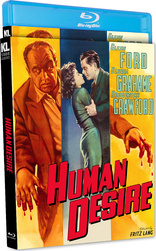Human Desire Blu-ray Movie
HomeHuman Desire Blu-ray Movie 
Kino Lorber | 1954 | 91 min | Not rated | Jul 11, 2023Movie rating
7 | / 10 |
Blu-ray rating
| Users | 0.0 | |
| Reviewer | 4.0 | |
| Overall | 4.0 |
Overview
Human Desire (1954)
Korean War vet Jeff Warren returns to his job as a railroad engineer, and quickly succumbs to his boss's wife, Vicki Buckley. Thus begins a tangled web of suspicion, sex and murder involving Vicki and her brutish husband Carl.
Starring: Glenn Ford, Gloria Grahame, Broderick Crawford, Edgar Buchanan, Peggy MaleyDirector: Fritz Lang
| Film-Noir | Uncertain |
| Drama | Uncertain |
| Romance | Uncertain |
Specifications
Video
Video codec: MPEG-4 AVC
Video resolution: 1080p
Aspect ratio: 1.85:1
Original aspect ratio: 1.85:1
Audio
English: DTS-HD Master Audio 2.0 Mono (48kHz, 24-bit)
Subtitles
English SDH
Discs
Blu-ray Disc
Single disc (1 BD)
Packaging
Slipcover in original pressing
Playback
Region free
Review
Rating summary
| Movie | 4.0 | |
| Video | 4.0 | |
| Audio | 5.0 | |
| Extras | 2.0 | |
| Overall | 4.0 |
Human Desire Blu-ray Movie Review
Reviewed by Dr. Svet Atanasov July 16, 2023Fritz Lang's "Human Desire" (1954) arrives on Blu-ray courtesy of Kino Lorber. The supplemental features on the release include archival program with actress Emily Mortimer and vintage trailer for the film. In English, with optional English SDH subtitles for the main feature. Region-Free.
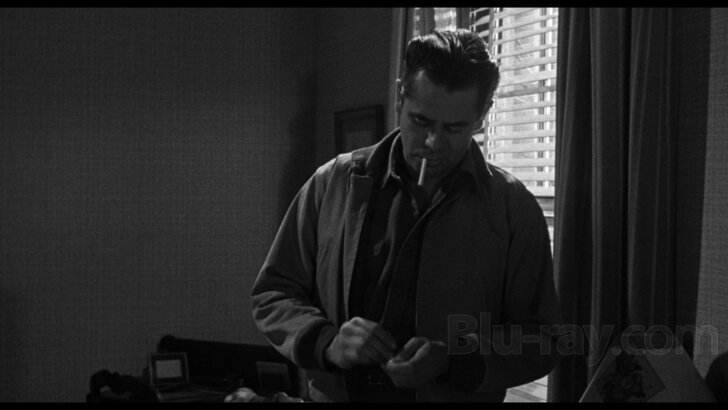
The two films that Emile Zola’s famous novel inspired are quite different, but what is more interesting is that both actually take plenty of liberties with the original material and its tone. Jean’s Renoir’s La Bęte Humaine is the darker, more cynical and pessimistic film, but carries the identity of an early European social drama. Fritz Lang’s film noir, Human Desire, which came out sixteen years later, retains very little of the cynicism that defines Zola’s novel and in the end actually completely discards the pessimism. So, it does seem like Renoir and Lang made very unconventional compromises while crafting the stylistic identities of their films. What is truly odd, however, is that virtually all of the obvious compromises that one could easily identify to make a very strong case that there isn’t a perfect cinematic adaptation of Zola’s novel are precisely what make both films so good.
The narrative is broken into three uneven parts that shift the balance of powers between the main characters. In the first a war veteran named Jeff Warren (Glenn Ford) returns home from Japan and in a matter of days resumes his predictable civilian life -- working long shifts as a railroad engineer with his landlord and occasionally stopping by at the local bar to see friends. Then one day, while on the train as a passenger, Jeff bumps into Vicki Buckley (Gloria Grahame), the wife of Carl Buckley (Broderick Crawford), a co-worker with a serious drinking problem, and after she accidentally falls in his arms the two begin seeing each other. Soon after, Jeff discovers that Vickey and Carl’s marriage is so broken that she would immediately walk away from her husband if he encourages her to do so.
In the second part, Jeff realizes that his encounter with Vicki was not accidental, and that it is almost certainly related to the murder that occurred on the train at the same time. Then Vicki confirms to him that it is so, and insists that the only way the two can have a future together is if Carl is gone -- permanently.
The third part is where small details and nuances begin changing minds and hearts. The abusive Carl repeatedly confronts Vicki and even threatens to kill her, and Jeff, who already knows too much about the murder, is forced to make a decision -- remain silent and go away to start a new life with a woman that he loves, or end the complicated affair and look for love somewhere else.
While still in development, this project apparently looked very different. For example, initially, Lang and producer Lewis Rachmil were convinced that Rita Hayworth was the right actress to play Vicki, but when it became obvious that there were legal obstacles that would prevent her from traveling to Canada to shoot the film, they hired Grahame. Peter Lorre was also considered for the part of the vet, but the great actor did not even entertain the idea because he was so disappointed with Lang’s working methods during the shooting of M. Alfred Hayes’ script also had numerous corrections, and the film’s current finale was actually not part of the original draft.
All of the compromises and corrections, however, almost certainly made the film much stronger. Grahame’s nuanced performance, in particular, is so convincing that it is hard to imagine how a glamorous actress like Hayworth would have managed to appear casual, brittle, and desperate, but at the same time emerge strong enough to deceive and change minds. Similarly, instead of trying to imitate Jean Gabin’s performance, Ford heads in a completely new direction with his character and in the process alters the nature of the drama. For this very reason, the ‘human beast’ that emerges at the end of the film is actually a chameleon with multiple identities. (One of the best things about the film is that it takes a seemingly straightforward story that makes it quite a challenge to identify the real villain).
There is plenty of the typical noir stylization that gives the film a proper for the genre appearance, but there is also a lot of borderline documentary footage that produces some very unique contrasts.
Human Desire Blu-ray Movie, Video Quality 
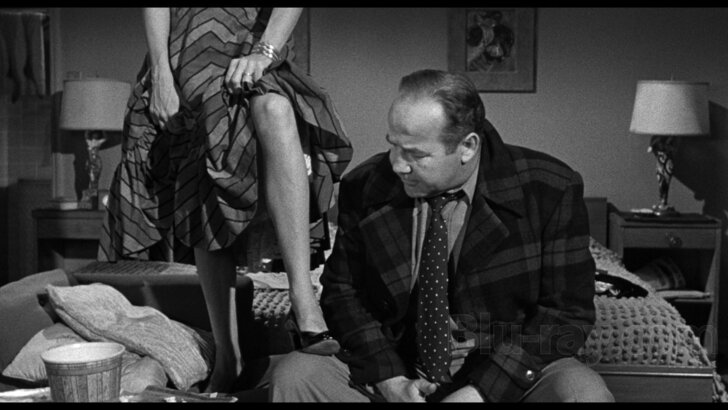
Presented in its original aspect ratio of 1.85:1, encoded with MPEG-4 AVC and granted a 1080p transfer, Human Desire arrives on Blu-ray courtesy of Kino Lorber.
In 2019, we reviewed this Region-B release of Human Desire which was sourced from an older remaster that was supplied by Sony Pictures. This release is sourced from the same remaster.
I think that the film looks good in high-definition. If you have a larger screen or project, you will rightfully conclude that a brand new 4K master will deliver superior visuals, but at the moment the film has an attractive organic appearance. What type of improvements can be made? Density levels could be better, but you need to keep in mind that there are several areas where the noticeable drops in density levels are inherited. (This is the footage that gives the film its documentary quality). The grayscale is convincing. However, I believe that some minor adjustments can be made to strengthen blacks and grays in select darker areas. But the existing master already handles darker areas very well, which is why there is no obvious crushing on it. Image stability is very good. There are no distracting age-related imperfections. (Note: This is a Region-Free Blu-ray release. Therefore, you will be able to play it on your player regardless of your geographical location).
Human Desire Blu-ray Movie, Audio Quality 
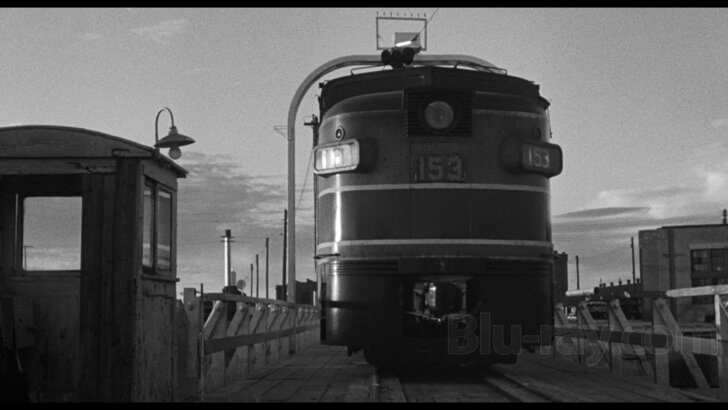
There is only one standard audio track on this Blu-ray release: Eng;osh DTS-HD Master Audio 2.0. Optional English SDH subtitles are provided for the main feature.
I do not think that there is any room for meaningful improvements. The audio is very clear, sharp, and stable. I did not encounter any age-related imperfections to report in our review either.
Human Desire Blu-ray Movie, Special Features and Extras 
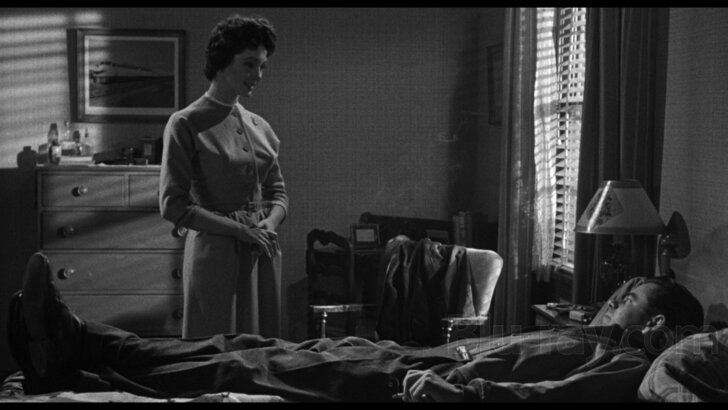
- Terror and Desire - in this archival program, actress Emily Mortimer discusses the nature of some of the conflicts that are depicted in Human Desire as well as the film's style and personality. In English, not subtitled. (10 min).
- Trailer - a vintage trailer for Human Desire. In English, not subtitled. (2 min).
- Cover - a reversible cover with vintage poster art for Human Desire.
Human Desire Blu-ray Movie, Overall Score and Recommendation 
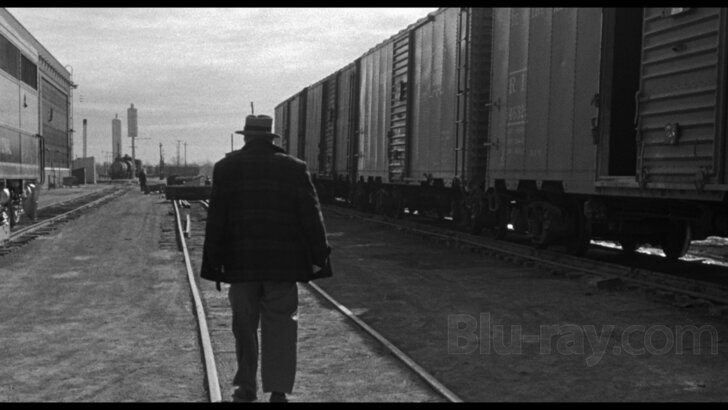
It is true that at least a casual comparison with Jean Renoir's La Bęte Humaine is unavoidable, but if you convince yourself that Fritz Lang's Human Desire is some sort of an American remake of it you are making a huge mistake. Even though both films were inspired by Emile Zola's popular novel, they treat the original material very differently and produce contrasts that ultimately send them in opposite directions. (And for the record, I don't mean only in terms of style). I find the characterizations in Lang's film very convincing, and I would not hesitate to place Gloria Grahame's performance amongst her very best. With Rita Hayworth playing the same character, which apparently was the original plan, I don't think that the film would have turned out as nicely as it did. HIGHLY RECOMMENDED.
Similar titles
Similar titles you might also like

Caught
1949

Footsteps in the Fog
1955

No Man of Her Own
I Married a Dead Man
1950

La Bęte Humaine
1938

Gilda
1946

Gun Crazy
1950

Highway Dragnet
1954

Leave Her to Heaven
1945

Clash by Night
Warner Archive Collection
1952

The Female Animal
1958

You Only Live Once
1937

Suddenly
Restored Classics
1954

Flamingo Road
Warner Archive Collection
1949

Sudden Fear
1952

Time Out of Mind
1947

Underworld
1927

Too Late for Tears
1949

The Crimson Kimono
Limited Edition to 3000
1959

Ace in the Hole
1951

House of Bamboo
Limited Edition to 3000 - SOLD OUT
1955
